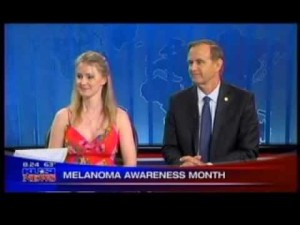
Melanoma Awareness Month with Briana Bilbray and Father
Below you will find a press release for oral arguments in Sacramento Nonprofit v. Holder which are scheduled for 1/13/14 in San Francisco. In 2011 a lawsuit was filed against the DOJ in response to the federal crackdown in the Southern District. The timing of the suit was coordinated with similar suits in all four federal districts throughout California. Those cases were ultimately denied relief in the U.S. District Courts and have been appealed to the Ninth Circuit Court of Appeal. Oral Arguments in the appeal will occur next week.
According to Lance Rogers, the handling attorney for the case in the Southern District, “this case has real legs and is a great vehicle to possibly change the current state of federal persecution of lawful cannabis patients and to establish a fundamental right to medical cannabis”.
In a case with roots in Imperial Beach, CA. on Monday, January 13, 2014 at 9:00 a.m. the Ninth Circuit Court of Appeals, sitting in San Francisco, will hear oral argument on whether citizens in the 9 Western states which make up the Ninth Circuit, have a fundamental right to possess, use, and distribute cannabis for medical purposes as allowed by state law. The underlying lawsuits that have led to the case being before the Ninth Circuit accuse the federal government of unconstitutionally intruding on that fundamental right. All of the 9 Western states in the Circuit have legalized or immunized medical cannabis use and possession.

Melanoma survivor Briana Bilbray sues Feds for a fundamental right to possess, use, and distribute cannabis for medical purposes as allowed by state law
Entitled Sacramento Nonprofit Collective et al v. Eric Holder et. al,, Case No. 12-15991, the case stems from the massive crackdown by the four United States attorneys in California against patients and collectively-owned dispensaries in California in 2011. During that crackdown, numerous people were arrested and prosecuted and numerous cannabis dispensaries were forced to close after their landlords received letters threatening property forfeitures. In some cases, the Department of Justice did initiate forfeiture proceedings against a number of properties. In response, the plaintiffs in all four federal districts of California – Sacramento, San Francisco, Los Angeles and San Diego – including cooperatives, landlords, and medical cannabis patients such as Briana Bilbray of Imperial Beach CA., the daughter of former California Congressman Brian Bilbray, sued the federal government. Their suit aims to allow them to lawfully possess and use cannabis to treat their medical conditions with a doctor’s recommendation without interference by the federal government. A positive ruling will impact the entire Ninth Circuit.
Plaintiffs have sought relief based on a number of legal claims, including whether, after 20 states plus the District of Columbia have enacted laws allowing the use of cannabis as medicine, there now exists a “fundamental right” to such possession and use, a right guaranteed under the US Constitution. Fundamental rights are rights that are either explicitly guaranteed by the Bill of Rights in the U.S. Constitution or are rights that have been recognized as basic to human existence, regardless of the existence of any government regulation or law. In the past, courts have found a fundamental right to interstate and intrastate travel, a right to privacy and particularly, within that privacy right, the right to marry, the right to procreate, the right of a woman to choose to have an abortion before fetal viability, the right to use contraceptives, and the right of unrelated people to live together.
One of the more recently recognized fundamental rights by the U.S. Supreme Court in 2003 was the right of people to engage in private, consensual sexual activity, a case stemming from the arrest of two gay men in Texas prosecuted under that state’s anti-sodomy laws. That case was Lawrence v. Texas.
David Michael, one of 7 attorneys on the plaintiffs’ legal team, will argue the case before the Ninth Circuit. Attorney Michael was also lead counsel in Raich v. Gonzeles, where, in 2004, this same Ninth Circuit ruled that the Commerce Clause of the U.S. Constitution did not apply to the intra-state growing and possession and use of medical cannabis. Seventeen months later, in 2005, the case went before the U.S. Supreme Court, which narrowly reversed the Ninth Circuit, holding that the Commerce Clause gave broad powers to the federal government over any activity that could impact interstate commerce. However, the Supreme Court has never weighed in on the issue of whether the possession and use of cannabis for medical purposes has now become a fundamental right.
The Ninth Circuit, though, did address the fundamental rights question when the Supreme Court sent the original case back down in 2007. At that time, only 11 states had a medical cannabis law in place. The Ninth Circuit, in its 2007 decision, Raich II, did portend however, that the courts would eventually recognize this right. The Ninth Circuit panel stated that “federal law is blind to the wisdom of a future day when the right to use medical marijuana to alleviate excruciating pain may be deemed fundamental. Although that day has not yet dawned, considering that during the last ten years eleven states have legalized the use of medical marijuana, that day may be upon us sooner than expected.”
Now that 20 states plus the District of Columbia have recognized medical cannabis, and other states have decriminalized cannabis use and possession, which encompasses more than 53% of the population of this country, Plaintiffs and their attorneys believe that the day has indeed dawned for society to finally recognize the medical use of cannabis as a fundamental right and that the federal courts, beginning with this Ninth Circuit, will now recognize that right and decide that it trumps any federal law to the contrary.
For more information contact:
DAVID MICHAEL – david@davidmichaellaw.com
MATTHEW KUMIN – matt@mattkuminlaw.com
ALAN SILBER – alan@alansilber.com
###






